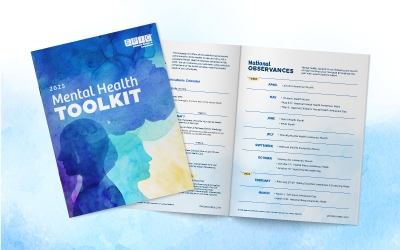Since the start of the pandemic over one year ago, there’s been a huge spotlight on mental health and a significant focus on the responsibility of the workplace to address employees’ mental health needs. It’s safe to say that employers have a challenge to address here and some organizations may be stepping up to that challenge more successfully than others.
A recent Wellness Council of America (WELCOA) workplace resiliency survey found that 45% of employees surveyed have experienced symptoms of burnout over the last twelve months, 69% of employees don’t feel like their employer has taken steps to support their mental health and only 37% of employers feel they have a strong understanding of the mental health and wellbeing of their people.
Viewpoints from Amanda LaPointe
In April, conversations ramped up around developing programs for Mental Health Awareness Month for our clients and their people.
Several groups looked to their insurance carrier and outside vendors to host webinars, while others struggled to understand how to address their population. Clients have shared that they’re experiencing increased mental health spend and utilization, employee barriers to care (such as the inability to afford copays for mental health visits) and limited or outdated benefit availability.
When it comes to employers overcoming some of these barriers, here’s what we can suggest:
- Don’t shy away from mental health – make it a priority
- Demonstrate to your employees that you care about their mental health – encourage open communication around it
- Listen to your employees’ needs
- Revisit/shift your benefits strategy and make the resources easily accessible
- Implement mental health employee and manager training
- Make mental health a part of your culture
- Be mindful of generation gaps and how different age groups prefer to access care
- Offer an integrated approach to your mental health benefits
- Get buy-in from leadership
Employees are seeking resources to address mental health concerns and all eyes are on employers to step up to the challenge.
We know the need for mental health support exists, utilization of resources is rapidly going up and employees are still experiencing barriers to care. Now is the time to meet employees where they are at. Give them the tools to improve their mental wellbeing to bring about an uptick in productivity and a reduction in presenteeism.
If your company is unable to invest in new resources, it’s time to get creative and explore how you can make internal changes to support employee needs and challenges.
That might mean weaving mental health into your culture – offering paid “Mental Health Days” off, increasing your mental health discussions and communications, or establishing an open-door policy for mental health conversations. Our Wellness & Health Management team is here to help!
Take advantage of opportunities throughout the year to emphasize your organization’s support for mental health and awareness – mark your 2021 calendars!
- April – Alcohol Awareness Month
- May – Mental Health Awareness Month
- July 24 – International Self-Care Day
- September 5-11 – Suicide Prevention Week
- September 10 – Suicide Prevention Day
- October 10 – World Mental Health Day
EPIC offers these opinions for general information only. EPIC does not intend this material to be, nor may any person receiving this information construe or rely on this material as, tax or legal advice. The matters addressed in this article and any related discussions or correspondence should be reviewed and discussed with legal counsel prior to acting or relying on these materials.
COVID-19 RESOURCES
Related Content
Products
Employee Benefits Consulting
Our dedicated benefits team is focused on delivering better outcomes – to both your benefits program and ...
Products
Wellbeing & Health Management
Our consultants help you create a strategy around health management that will impact your culture and your ...
Products
Communications & Engagement
Our Communications & Engagement team develops effective campaigns that enhance workforce awareness and ...



